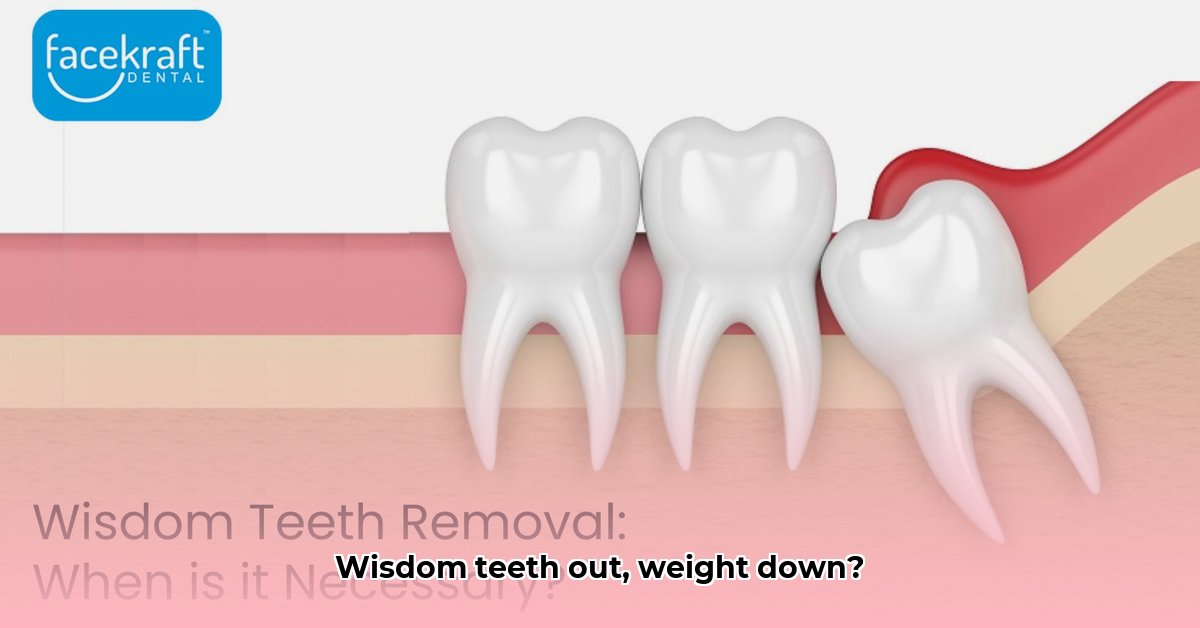
Wisdom Teeth Extraction and Weight Change: A Comprehensive Review
Getting your wisdom teeth removed is a common procedure, but many patients wonder about its potential impact on their weight. Will they lose weight, gain weight, or see no change? The answer, unfortunately, isn't straightforward. This review examines the complex relationship between wisdom teeth extraction and weight fluctuations, exploring the factors involved and offering practical advice for patients.
The Factors Influencing Post-Surgery Weight
Several factors contribute to the variability in weight changes after wisdom teeth removal. These include dietary restrictions, pain medication, and individual metabolic responses. Let's delve into each:
Dietary Restrictions: Immediately following the procedure, patients typically follow a soft food diet, limiting calorie intake. This can lead to temporary weight loss. However, this effect is usually short-lived and reverses once normal eating resumes. Is this temporary weight loss a significant concern? Not usually, but maintaining good nutrition during recovery remains crucial.
Pain and Medication: Post-operative pain and medication can significantly affect appetite. Nausea and discomfort may reduce food consumption, possibly leading to weight loss. However, some medications might cause increased appetite or water retention, potentially leading to weight gain. This effect is highly individual and unpredictable.
Individual Metabolism and Body Composition: Each person's metabolism varies widely. Factors such as pre-existing health conditions, activity levels, and body composition influence how the body processes food and energy, thus affecting any weight changes post-surgery.
The Scientific Evidence: A Review of Existing Research
Currently, there's limited specific research directly linking wisdom teeth extraction to significant, sustained weight changes. While the soft-food diet component may lead to temporary weight loss, the overall impact remains largely anecdotal and highly variable. Further research is needed to establish clear correlations and quantify the effect. What we know, however, is that any weight changes will likely be temporary.
Key Takeaways from Existing Research and Clinical Observations:
- Temporary Weight Fluctuations: Weight change after wisdom teeth removal is typically temporary and often modest.
- Dietary Impact: The most significant factor influencing weight is the temporary dietary restriction required for healing.
- Individual Variability: The response to surgery and subsequent weight changes varies considerably from person to person.
Managing Weight and Health After Wisdom Teeth Extraction
While significant, sustained weight change is unlikely, focusing on healthy recovery remains paramount. Here's a practical, step-by-step approach:
Pre-operative Consultation: Discuss any weight-related concerns with your dentist or oral surgeon before the procedure. They can provide personalized dietary advice and manage expectations.
Hydration: Maintain adequate hydration throughout the recovery period. Water is crucial for healing and overall well-being.
Nutritious Soft Foods: Opt for nutritious soft foods during the initial recovery phase. Smoothies, soups, yogurt, and well-cooked vegetables are excellent choices. Minimize processed foods and sugary drinks.
Monitoring Weight: Keep an eye on any significant or unexpected weight changes. If you observe drastic fluctuations, contact your doctor or dentist.
Post-recovery Lifestyle: Once healed, revert to a balanced diet and regular physical activity to maintain a healthy weight and overall well-being. "Focusing on overall health, not just weight, is critical for long-term well-being," says Dr. Anya Sharma, DDS, from the American Dental Association.
Addressing Potential Risks
While weight fluctuations are usually benign and temporary, some risks warrant attention:
- Dehydration: Adequate fluid intake is paramount for healing and avoiding dehydration complications.
- Malnutrition: Ensure you receive sufficient nutrients during recovery, focusing on nutrient-dense, soft food options.
- Infection: Maintain good oral hygiene to minimize the risk of infection. Report any signs of infection to your dentist immediately.
"The key is to prioritize healing, not weight loss," emphasizes Dr. David Lee, DMD, Oral Surgeon at University Hospital.
Remember, seeking wisdom teeth removal solely for weight loss is unproductive and potentially harmful. The focus should always be on proper healing and maintaining a healthy lifestyle. Any weight changes are usually a temporary byproduct of the recovery process.